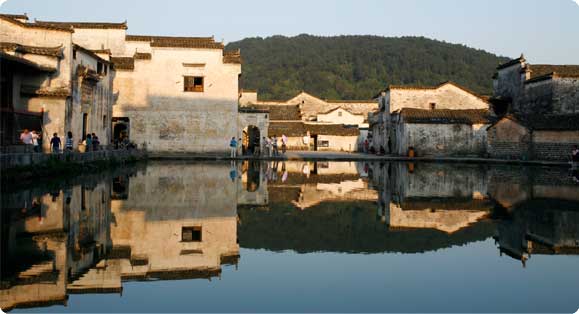Hong Village
宏村

Located in Yixian County, Xidi and Hongcun Ancient Villages were listed as World Heritage Sites by UNESCO in 2000. These two villages are the most representative local-style residences in southern Anhui Province.
Construction of Xidi Village began during the Northern Song Dynasty (960-1127). So far, it has a history of over 900 years. The village is famed as being the 'Ming and Qing Dynasty Local Residence Museum'. It has about 124 ancient residences and three ancestral halls, including an archway, Linyun Pavilion, Eastern and Western Gardens, Ruiyu Courtyard, Taoli Garden, Da Fu Grand House and Lvfu Hall. Da Fu is an official title reserved for high ranking government officials in ancient China.
The three carving styles including those on stones, bricks and wood are the most renowned. Tourists can appreciate these exquisite carvings on door frames, lattice walls, columns and beams in the halls. The birds, flowers, grass and figures on them are vividly presented. Both the Ming and Qing Dynasty carvings display poise and refinement.
Encircled by green hills, two streams flow through the village from north and east converging at Huiyuan Bridge. The village has two main streets and about 99 lanes. All the streets and lanes are paved with cobbles or black stones. The residences, lanes and streets combine well with the hills and streams.
Lying about 10 kilometers (6 miles) northeast of Yixian County, Hongcun Village enjoys the reputation of 'a village in the beautiful Chinese picture' because of its location at high altitude and being shrouded by clouds and mist. It has about 137 Ming and Qing style residences.
Hongcun Village is built in the shape of an ox. The locals liken Leigang Hill as the 'head', two huge trees on the hill as the 'horns', the residences in the village as the 'body', a winding stream as the 'intestines', a crescent pond as the 'stomach' and the four bridges as the 'four feet'.
Built with pink walls and black tiles, all the residences are better arranged. Among them, the Chengzhi Hall is the most representative and is praised as the 'Folk Imperial Palace'. Numerous varieties of figures and patterns are carved on the columns, beams and door frames and are gilded with gold. It is said that about five kilograms (11 pounds) gold had been used in gilding the wood carvings during the construction of the house. The Chengzhi Hall is the best preserved. Hundreds of visitors from home and abroad are fascinated by its wood carvings.
|



